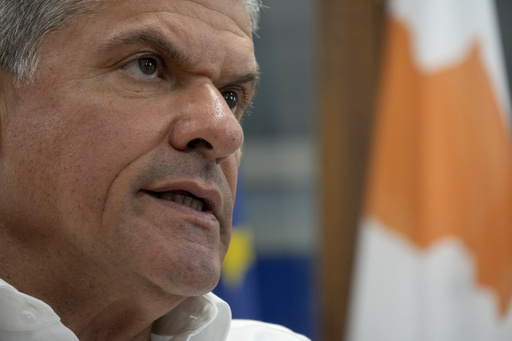NICOSIA, Cyprus (AP) — The future of an electricity cable linking the power grids of Greece, Cyprus and Israel will be cleared up next month when a ruling is expected on whether Cypriot consumers would pick up the tab for the cable’s four-year construction costs, Cyprus’ energy minister said Thursday.
Officials have said the 1.9-billion-euro ($2.06 billion) cable, known as the Great Sea Interconnector, would end the energy isolation of both the east Mediterranean island nation and Israel while promising consumers cheaper energy through the conveyance of more power generated from renewable energy sources (RES). The European Union is partly financing the project with 657 million euros.
The Greek project operator, the Independent Power Transmission Operator, or IPTO, initially made it a condition that construction costs should be borne by Cypriot taxpayers to make the project viable and, in turn, attract investors. That was turned down by the Cypriot energy regulator, CERA.
Minister George Pananastasiou said Thursday the regulator will render its definitive ruling on Aug. 12.
According to Pananastasiou, IPTO’s calculations which it has submitted to CERA to reconsider its decision show that the additional burden for Cypriot consumers over the four-year construction period would be minimal, at 0.6 of one euro cent per kilowatt hour of energy consumption.
Already 40-50 kilometers (25-31 miles) of cable has been laid along the Mediterranean seabed as part of the project’s first phase connecting the Greek island of Crete with Cyprus. Cypriot consumers will benefit almost immediately from a 30%-40% drop in energy prices once the cable goes online, Papanastasiou told the Associated Press in an interview.
The Cypriot government is also expected to decide in September whether to pour 100 million euros into the project after evaluating a viability assessment.
The electricity cable is part of Cyprus’ strategy to wean itself off crude oil. The country is also looking to build its first natural gas terminal that would use cheaper, imported liquified natural gas to fire up its power plants. Papanastasiou said this would result in a 40%-45% drop in greenhouse gas emissions.
However, the construction of the LNG terminal has been beset by problems.
Last week, the Chinese-led CPP-Metron consortium pulled out of its contract to build the terminal because of a financial dispute. Cyprus’ President Nikos Christodoulides said Monday the consortium should never have been awarded the contract in the first place because it couldn’t see it through.
The terminal was supposed to have been completed by 2022 and an accompanying ship that converts liquefied natural gas back into gaseous form is still stuck in Shanghai under a heap of legal red tape.
Papanastasiou said the Cypriot government is determined to complete the project in a year’s time by using the same subcontractors who had been hired by the Chinese-led consortium or others who could finish it faster and cheaper. Regarding the ship, Papanastasiou said if legal wranglings continue to hold up its delivery, then the government would look to charter a similar-sized vessel to start importing natural gas in time for the completion of the terminal.
The energy minister said current quantities of natural gas found off Cyprus’ southern coastline still don’t justify the investment for either supplying its very small domestic market or the construction of an onshore processing plant to liquify the gas for export.
He said hopes rest on ExxonMobil’s new drilling scheduled for next year for a significant discovery that would warrant construction of such infrastructure.
This website uses cookies so that we can provide you with the best user experience possible. Cookie information is stored in your browser and performs functions such as recognising you when you return to our website and helping our team to understand which sections of the website you find most interesting and useful.
